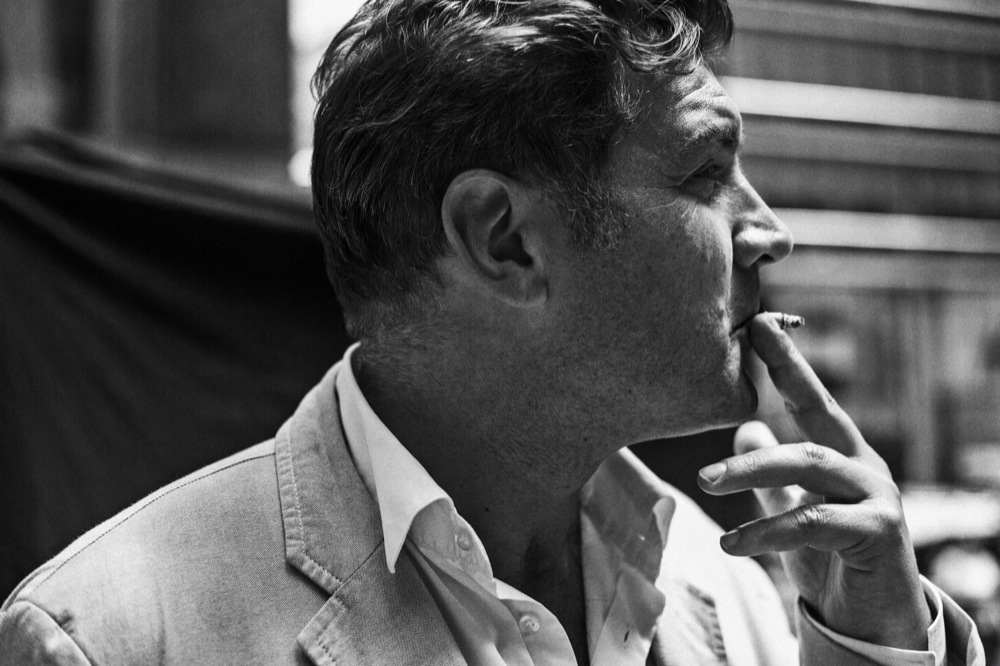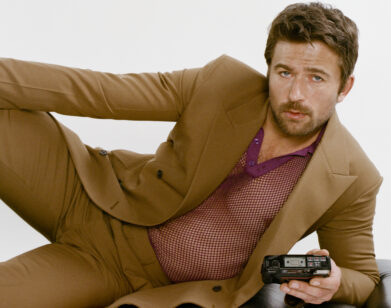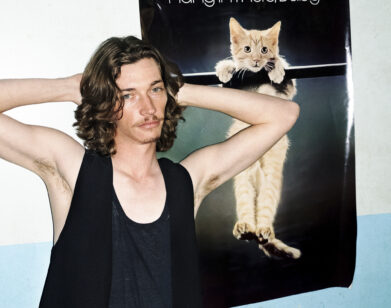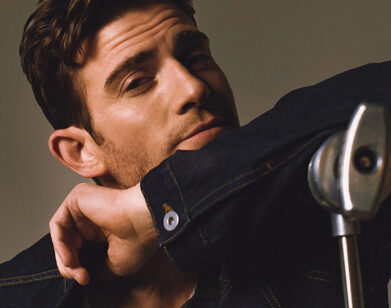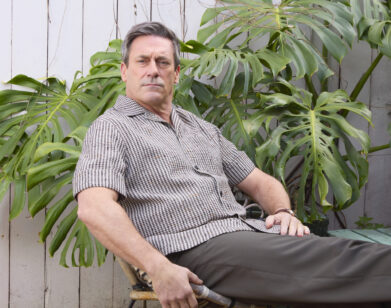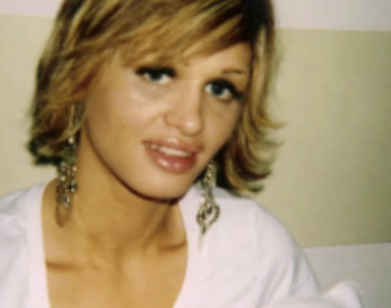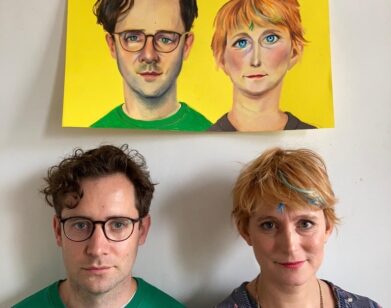Thomas Bidegain’s Solo Song
THOMAS BIDEGAIN IN NEW YORK, JUNE 2016. PHOTO: VICTORIA STEVENS.
Thomas Bidegain knows how to tell a story. As his friend Jacques Audiard‘s go-to screenwriter, the Frenchman has penned some of the most compelling films of the last decade, including The Beat that My Heart Skipped, A Prophet, Rust and Bone, and Dheepan. His work often centers around a marginalized individual, from A Prophet‘s Malik (Tahar Ramin), a young French convict of Arab descent caught between prison factions, to Rust and Bone‘s isolated boxer-turned-bouncer Ali (Matthias Schoenaerts). His characters are fully formed and easy to empathize with, even when their actions are uncomfortable.
“When you’re in the middle of writing, it’s really like having a second life. The people are so real. You know how they talk, how they react. They’re the ones who guide you through the story,” Bidegain explains over lunch in New York. “You have to see the world through their eyes; you cannot be ahead of them,” he continues. “You don’t have to judge them. It’s too easy to make fun of characters…you have to like them.”
After 15 years writing screenplays, Bidegain made his directorial debut at Cannes last year with Les Cowboys. Loosely inspired by The Searchers, the film, which came out in the U.S. last week after doing the festival circuit at the New York Film Festival and TIFF, follows the Balland family from the mid-’90s through to 2011. Though Alain and Nicole Balland are French, they like to get together with their conservative friends at Texas-style, country shindigs, complete with horses, cowboy boots, line dancing, and country music. When their teenage daughter Kelly runs away with her boyfriend Ahmed and converts to Islam, Alain is determined to bring her back home. He enlists his young son, known as Kid (Finnegan Oldfield), to help him track Kelly down.
EMMA BROWN: Did you always want to direct?
THOMAS BIDEGAIN: I wanted to direct when I was very young. I had no idea of cinema, of who’s doing what. That was my first instinct: “Okay, I want to be the boss.” I’ve worked in film all my life. I was a distributor, I produced films, and then I start writing. I wrote for a long time, 15 years. When I had the idea for Les Cowboys I thought, “Oh no, it’s my song. I’m going to have to sing it myself.”
BROWN: I heard a friend told you about these French people who are obsessed with rodeo culture and cowboys.
BIDEGAIN: Yeah! He gave me a book of photographs called Horizonville about people in Switzerland, in the Rhone Valley on the Swiss side, who dress up like cowboys and live their life like cowboys. It looks like photos from Midwest. It’s very weird. I saw that and I was like, “Half the job is already done.”
BROWN: Did you go find these people or did you just work based off of the book?
BIDEGAIN: Of course. In the movie, all the extras that are in the cowboy reunion came with their own stuff. We asked the real people to come and everybody showed up—the dancers. It’s crazy. A lot of people are like that, not only in France, but in Belgium, Switzerland, a lot of northern Europe, England, Germany. Sometimes it’s just a dance, sometimes it’s the horses, sometimes it’s all together, or the music or the old cars. It’s like a dream America, a fantasy of what America could be. It’s a place where people feel safe. When you go there people are very nice. It’s a bit like when you go to small-town America or somewhere like that; people are very welcoming and very warm. [But] after an hour or two [you think], “There’s no black people here, no people of color.” It started being a little disturbing.
BROWN: That’s what I was going to ask—are these communities more conservative?
BIDEGAIN: Yeah. It’s really a white people passion. It’s one of the images that I had in mind—to have a cowboy reunion and at the center you put a woman wearing a veil. That image is in the film. It’s really a reduced model of our society in Europe. Some people react very badly and others will think there is no difference.
BROWN: Where did The Searchers come in?
BIDEGAIN: I felt, “Let’s make a western, a modern day western.” It was the idea of that metaphor—because those guys believe they’re cowboys, they think Muslims are the Indians. The film is built on that metaphor. It’s called Les Cowboys, but it could be Les Cowboys and Les Indians. The Searchers is a starting point and then it evolves. The story of the son is a bit different. He gets a little smarter. In that sense the film is very optimistic because we always hope our sons will be a little smarter than we are.
BROWN: The people that you met through these cowboy reunions, did they know who you are? Were they familiar with your work?
BIDEGAIN: Some of them. Some of the films I’ve written have been popular in France, like A Prophet. A Prophet and Rust and Bone are the two that made it to a wider audience, but no, I’m a first-time director. It was very nice—being unknown, it’s a good thing.
BROWN: The actor who played Kid was really excellent in the movie. How did you find him? It doesn’t seem like he’s done that much stuff.
BIDEGAIN: It was a very long process. We had to invent him. We had to create him. He did not exist. I saw a lot of non-actors and actors, young people, and when I saw Finnegan [Oldfield] there was something very mysterious about him. Kid isn’t someone who talks very much. I saw that mystery in Finnegan and I thought it was great; children are always a mystery for their parents. I saw 60 or 80 people. I interviewed each one of them because I wanted to feel something. It was a long process. At the end of the day I had two or three, but when we put Finnegan and François [Damiens] together—because of the way Finnegan is reserved —François was much better with him. He didn’t know where to stand and that was great. Uneasiness, it’s really like that when you are parent and have a 19-year-old. It’s difficult to relate to him.
BROWN: I wanted to go back to the beginning. You mentioned you’ve always worked in film. Did you come from a creative family where working in film was a feasible goal?
BIDEGAIN: No. It was an impossible thing to work in film in my family. I studied economics, but I knew I wanted to work in film. Each time I had an internship to do or an essay to write, I would always do it in the field of cinema. Nobody in my family worked in film and nobody could understand it. I think it’s only after I got my first César that my mother started to understand what screenwriting is really about.
BROWN: What was your first paid job in the film industry?
BIDEGAIN: It was in Los Angeles. I was working at a distribution company that distributed classic films, European films. It was a long time ago before DVDs. Nobody cared. It was at the bottom of the food chain. It was just VHS of old films. It was a weird thing, but it was in Los Angeles so it really helped me demystify the whole Hollywood thing. You end up in a storage room putting in VHS tapes and dubbing newsreels and things like that. It was boring.
BROWN: How old were you?
BIDEGAIN: I was 24.
BROWN: When and how did you meet Jacques Audiard?
BIDEGAIN: I’ve known Jacques since I was a student. I was a good friend of the girl who became his wife, Marion [Vernoux]. When I started working in film we would talk a lot about it. At one point I was head of distribution at MK2 in Paris, and he brought me a Lodge Kerrigan screenplay. He had met with Lodge, and we made the film at MK2. It’s called Claire Dolan. It was at Cannes in ’98. When I started writing, I would show it to him. I would read his screenplays and then like that, we started working together on The Beat That My Heart Skipped [2005].
BROWN: Is it hard to switch from the production side to the creative side in terms of how people see you?
BIDEGAIN: It came to me very naturally. Being in the industry, not that many people change positions. People who work in distribution will be distributors all their life. But I think it’s great to change—change country, change anything. Even now, I’m old now, but I made the move to directing and it was nice. I wish to keep on writing for others and write my own stuff at the same time.
BROWN: Is this the first story you felt, “This is my story”?
BIDEGAIN: There was one story I had, but I sold it. [laughs] I sold it because I thought it was maybe too close to Jacques. That was a noir film and I sold it to a friend. He made it and it came out last year in France. It was too reminiscent to Jacques’ universe. Les Cowboys is a film that Jacques would have never done. That’s why when I had that idea, I was like, “That’s mine.”
BROWN: A lot of the films that you’ve written have been very well-received. Do you get sent a lot of Hollywood screenplays?
BIDEGAIN: I have an American agent since last year. The only thing I asked him was, “Don’t send me a screenplay. I will never read them.” I’ve been with him for a year and he sent me two or three things, which is great. I read it.
There’s one thing Jacques told me before I started. He was shooting Dheepan the same time I was shooting Les Cowboys. We were having dinner once a week on Sunday night or something like that, talking about our miseries. He told me, “You will see that screenwriting is a job and directing is a state of mind.” He was absolutely right. When you’re a screenwriter, it’s like being a mechanic. You open the hood of the story, the director is the driver, and he says, “What do you think? It’s a little tough. When I pull on the brake it doesn’t…” You fix the thing. Directing, you have to put yourself in a certain state, it’s all about the energy you have and the energy you transmit to people, to the actors, to the crew. It’s peculiar. There’s a Chinese saying: “The first part that rots is the head.” It really does. I’ve seen it.
BROWN: What was going shooting in India like?
BIDEGAIN: It was great. I really insisted on going to India because when people read a screenplay and they see Pakistan or Afghanistan, they call a friend in Morocco every time. You’ve seen it so many times—in Star Wars, anywhere. I really wanted to go [to India]. I had no idea if we would have the money—it’s further away and it’s expensive. The crews are great. It’s a different way of seeing cinema, but everybody is very creative. They’re very dedicated, they’re very happy to work on a European film. It’s different than Bollywood. There are a lot of film buffs. Some extras came to me and said, “I’ve seen A Prophet and Rust and Bone.” They were very enthusiastic and very dedicated to the project. We shot in Rajasthan, which is on the border of Pakistan. It’s very difficult to shoot in Pakistan. You can go, but the problem is coming back. The light was great. It was exactly what we wanted. It’s a part of the film. It’s history and geography and both of them were important in the film.
BROWN: If you hadn’t been working on Les Cowboys, would you have been on the set of Dheepan?
BIDEGAIN: Yeah. I don’t do much on set, but what I do for Jacques is I watch the dailies every day and I make notes on everything I see. Also Jacques will ask me to rewrite scenes because something will be different—the weather will be different, an actor will be different, the location will be different. Something will change and it will affect it. You have to keep the film alive. I did a lot of rewrites on A Prophet and on Rust and Bone also. I would have done that. It was very weird when I saw Dheepan—it was like seeing someone else’s film. The past three or four films with Jacques, I’ve been so close.
BROWN: Do you have someone who functions for you as you did for Jacques?
BIDEGAIN: Noé Debré. He’s a young screenwriter and I took him on for Dheepan. We started Dheepan a long time ago, when Jacques and I were working on Rust and Bone. I would see Noé every week, Jacques would see Noé every other week or something like that. Noé did that for me. He was watching the dailies, giving me notes.
BROWN: If you’re constantly working on the film as you shoot, does it make it easier when you start editing?
BIDEGAIN: I wish. Editing is a very tough period. You’re confronted with yourself. It’s a deep, dark, truthful mirror. You’re confronted with what you have and what you’ve been able to master and sometimes it’s not enough. It’s tough, especially the beginning. After that the film starts to build and the film will take over. I witnessed that with Jacques. It was always a tough time for him and it’s exactly the same. Nightmares, you don’t sleep for weeks. Then you start seeing the light and then [snaps fingers], “This looks better. This works here.” You get over it.
BROWN: Do you think there’s a common thread in all of the screenplays you’ve written?
BIDEGAIN: I think there are two things: the idea of representation, that it’s great to represent things that are not represented. With Dheepan, the idea was you will never see a guy selling roses at your table the same way. Those are people you see all the time and you don’t give them life. It’s that idea that things [only] exist once they are represented. When someone offers me a job or a project, I always ask myself, “What does it tell me about the world?” and “Have I seen it before?” Two good questions.
The great thing about Europe is that things have not been represented [as much]. If you open the door of a bar in Brooklyn in a film you know exactly who is the mobster, who is the nice guy, who is the drunk, who’s the waitress, who’s the lonely heart. If you push open the door to a bar in Antwerp or Lisbon or Rotterdam, people will talk five different languages. You don’t know who’s who. You don’t know if that guy is a banker or a mobster. That’s the luck we have with making films in Europe. It’s still, in some ways, a virgin territory for a lot of stories. It’s funny to see people in 10-gallon hats somewhere in France or Switzerland. You think, “Wow, is this real?” You do it in Wyoming and it’s redundant.
LES COWBOYS IS OUT IN SELECT THEATERS NOW.

